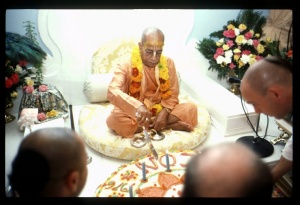SB 11.5.29-30: Difference between revisions
No edit summary |
(Vanibot #0054 edit - transform synonyms into clickable links, which search similar occurrences) |
||
| Line 28: | Line 28: | ||
<div class="synonyms"> | <div class="synonyms"> | ||
''[//vanipedia.org/wiki/Special:VaniSearch?s=namaḥ&tab=syno_o&ds=1 namaḥ]'' — obeisances; ''[//vanipedia.org/wiki/Special:VaniSearch?s=te&tab=syno_o&ds=1 te]'' — unto You; ''[//vanipedia.org/wiki/Special:VaniSearch?s=vāsudevāya&tab=syno_o&ds=1 vāsudevāya]'' — Vāsudeva; ''[//vanipedia.org/wiki/Special:VaniSearch?s=namaḥ&tab=syno_o&ds=1 namaḥ]'' — obeisances; ''[//vanipedia.org/wiki/Special:VaniSearch?s=saṅkarṣaṇāya&tab=syno_o&ds=1 saṅkarṣaṇāya]'' — to Saṅkarṣaṇa; ''[//vanipedia.org/wiki/Special:VaniSearch?s=ca&tab=syno_o&ds=1 ca]'' — and; ''[//vanipedia.org/wiki/Special:VaniSearch?s=pradyumnāya&tab=syno_o&ds=1 pradyumnāya]'' — to Pradyumna; ''[//vanipedia.org/wiki/Special:VaniSearch?s=aniruddhāya&tab=syno_o&ds=1 aniruddhāya]'' — to Aniruddha; ''[//vanipedia.org/wiki/Special:VaniSearch?s=tubhyam&tab=syno_o&ds=1 tubhyam]'' — to You; ''[//vanipedia.org/wiki/Special:VaniSearch?s=bhagavate&tab=syno_o&ds=1 bhagavate]'' — the Personality of Godhead; ''[//vanipedia.org/wiki/Special:VaniSearch?s=namaḥ&tab=syno_o&ds=1 namaḥ]'' — obeisances; ''[//vanipedia.org/wiki/Special:VaniSearch?s=nārāyaṇāya&tab=syno_o&ds=1 nārāyaṇāya] [//vanipedia.org/wiki/Special:VaniSearch?s=ṛṣaye&tab=syno_o&ds=1 ṛṣaye]'' — to Lord Nārāyaṇa Ṛṣi; ''[//vanipedia.org/wiki/Special:VaniSearch?s=puruṣāya&tab=syno_o&ds=1 puruṣāya]'' — the supreme enjoying male and the creator of the material universe; ''[//vanipedia.org/wiki/Special:VaniSearch?s=mahā&tab=syno_o&ds=1 mahā]-[//vanipedia.org/wiki/Special:VaniSearch?s=ātmane&tab=syno_o&ds=1 ātmane]'' — the supreme being; ''[//vanipedia.org/wiki/Special:VaniSearch?s=viśva&tab=syno_o&ds=1 viśva]-[//vanipedia.org/wiki/Special:VaniSearch?s=īśvarāya&tab=syno_o&ds=1 īśvarāya]'' — the Lord of the universe; ''[//vanipedia.org/wiki/Special:VaniSearch?s=viśvāya&tab=syno_o&ds=1 viśvāya]'' — and Himself the very form of the universe; ''[//vanipedia.org/wiki/Special:VaniSearch?s=sarva&tab=syno_o&ds=1 sarva]-[//vanipedia.org/wiki/Special:VaniSearch?s=bhūta&tab=syno_o&ds=1 bhūta]-[//vanipedia.org/wiki/Special:VaniSearch?s=ātmane&tab=syno_o&ds=1 ātmane]'' — the Supersoul of all living beings; ''[//vanipedia.org/wiki/Special:VaniSearch?s=namaḥ&tab=syno_o&ds=1 namaḥ]'' — obeisances. | |||
</div> | </div> | ||
Latest revision as of 20:48, 17 February 2024

A.C. Bhaktivedanta Swami Prabhupada
Please note: The synonyms, translation and purport of this verse were composed by disciples of Śrīla Prabhupāda
TEXTS 29-30
- namas te vāsudevāya
- namaḥ saṅkarṣaṇāya ca
- pradyumnāyāniruddhāya
- tubhyaṁ bhagavate namaḥ
- nārāyaṇāya ṛṣaye
- puruṣāya mahātmane
- viśveśvarāya viśvāya
- sarva-bhūtātmane namaḥ
SYNONYMS
namaḥ — obeisances; te — unto You; vāsudevāya — Vāsudeva; namaḥ — obeisances; saṅkarṣaṇāya — to Saṅkarṣaṇa; ca — and; pradyumnāya — to Pradyumna; aniruddhāya — to Aniruddha; tubhyam — to You; bhagavate — the Personality of Godhead; namaḥ — obeisances; nārāyaṇāya ṛṣaye — to Lord Nārāyaṇa Ṛṣi; puruṣāya — the supreme enjoying male and the creator of the material universe; mahā-ātmane — the supreme being; viśva-īśvarāya — the Lord of the universe; viśvāya — and Himself the very form of the universe; sarva-bhūta-ātmane — the Supersoul of all living beings; namaḥ — obeisances.
Translation and purport composed by disciples of Śrīla Prabhupāda
TRANSLATION
"Obeisances to You, O Supreme Lord Vāsudeva, and to Your forms of Saṅkarṣaṇa, Pradyumna and Aniruddha. O Supreme Personality of Godhead, all obeisances unto You. O Lord Nārāyaṇa Ṛṣi, O creator of the universe, best of personalities, master of this cosmos and original form of the universe, O Supersoul of all created entities, all homage unto You."
PURPORT
Śrīla Jīva Gosvāmī explains that although Lord Kṛṣṇa appeared at the end of Dvāpara-yuga, great sages chanted this verse from the beginning of that age in expectation of His appearance.
Ordinary living entities, although eternally subordinate to the Lord, become absorbed in attempting to dominate the material creation yet ultimately remain under the control of the Supreme Lord. The constitutional position of the living entity is engagement in the Lord's service. It is further the constitutional position of the material nature to be engaged by the living entity in satisfying the transcendental desires of the Lord. Thus these prayers, as mentioned in this verse, are offered to the Supreme Lord in accordance with the Pañcarātra and the Vedic mantras so that one may become fixed in remembering his eternal subordination to the Absolute Truth.
The supreme living entity, Kṛṣṇa, eternally manifests Himself as the catur-vyūha, or quadruple plenary expansion. The purport of this prayer is that one should give up his false ego and pray to this catur-vyūha by offering Them obeisances. Although the Absolute Truth is one without a second, the Absolute Truth displays His unlimited opulences and potencies by expanding Himself in innumerable plenary forms, of which the catur-vyūha is a principal expansion. The original being is Vāsudeva, the Personality of Godhead. When the Godhead manifests His primeval energies and opulences, He is called Saṅkarṣaṇa. Pradyumna is the basis of the Viṣṇu expansion who is the soul of the entire universe, and Aniruddha is the basis of the personal manifestation of Viṣṇu as the Supersoul of every individual entity within the universe. Among the four plenary expansions mentioned here, the original expansion is Vāsudeva, and the other three are considered to be particular manifestations of Him.
When the living entity forgets that both he himself as well as the material nature are meant for the Lord's service, the quality of ignorance becomes prominent, and the conditioned entity desires to become himself the master. Thus the conditioned soul imagines that he is a very important person within society or that he is a great philosopher. The Vedic mantras and Pañcarātra give mankind instructions about devotional service to the Personality of Godhead, which free one from the contamination of considering oneself a prestigious member of society or a great philosopher. One in knowledge should recognize himself as a tiny servant of the Supreme Absolute Truth.
In Dvāpara-yuga, Deity worship of the Lord is prominent. Such Deity worship is ultimately aimed at the process of śravaṇaṁ kīrtanaṁ viṣṇoḥ (SB 7.5.23). Without hearing and chanting the glories of the Lord one cannot perform Deity worship. In Deity worship it is required that the worshiper glorify the names, forms, qualities, paraphernalia, entourage and pastimes of the Supreme Lord. When such glorification is complete, the worshiper becomes eligible to realize transcendental knowledge through hearing about the Lord.